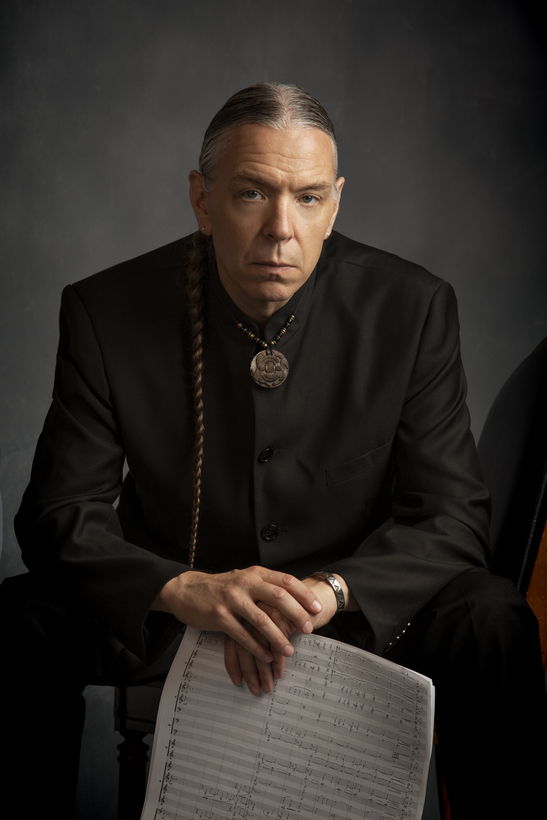“There are as many ways to be an American Indian as there are American Indians,” says Jerod Impichchaachaaha’ Tate, classical composer and citizen of the Chickasaw Nation, one of 39 federally recognized tribes settled across the state of Oklahoma. “Just like there are 8 billion ways in the world to be a person. There’s incredible diversity in how we are raised and what we’re exposed to.”
Tate’s father, an attorney, judge, and legal counsel whose lifelong service brought him an induction into the Chickasaw Hall of Fame, is also a trained pianist and baritone who used to set the house ringing with selections from Verdi, The Music Man, and whatever else struck his fancy. Tate’s mother, a Nebraskan of Manx Irish stock, taught theater and dance at the University of Wyoming. “I was a theater brat,” Tate says in summary. He was smitten with choreographic originals—Isadora Duncan, Nijinsky and his sister Nijinska, Martha Graham, Bob Fosse, Alvin Ailey—and maybe even more with the musical geniuses to which they gravitated, notably Debussy, Bartók, Stravinsky, and Shostakovich.
Tate, who declared at age nine that he would be a concert pianist, was pursuing his masters in piano performance at the Cleveland Institute of Music when his life unexpectedly changed course. His mother had begun work on a new 45-minute ballet with American Indian motifs—Winter Moons—and decided he should do the music. “You’re my Chickasaw kid,” she told Tate, still in his early 20s. “So, you get to write my score.” He began with a lick straight out of Shostakovich, adapted to a new purpose.
In the intervening three decades, regional and university orchestras have kept Tate at work nonstop. Thunder Song, a 30-minute crash course on classical and American Indian music that he curated for San Francisco Symphony’s video series, could be his gateway to broader mainstream recognition. His CD Lowak Shoppala’ (Fire and Light), released in June on the Azic label, marks another milestone; in addition to the symphonic instrumentals, the score calls for classical and tribal soloists, storytellers, and a children’s chorus. The next big thing on Tate’s plate is the full-length Shell Shaker: A Chickasaw Opera, commissioned by the conductor Tianhui Ng and the Mount Holyoke Symphony Orchestra for a concert premiere next March.
Matthew Gurewitsch: Your Web site identifies you as a “dedicated American Indian classical composer and pianist who expresses his native culture in symphonic music, ballet, and opera.” As inclusive as that sounds, isn’t it too narrow? Musically speaking, aren’t you a citizen of the world?
Jerod Impichchaachaaha’ Tate: As long as I can remember, without my knowing it, I was being groomed for that. I was saturated in theater of all kinds. I was saturated in modern dance, ballet, tap, and all sorts of ethnic dance my mom studied, including flamenco and belly dancing. The music that went along with all the dance was all over the map. I have a lot of nostalgia for that time. The artists whose music I grew up with brought their ethnicities and nationalities into their work in spades. So, when I started composing with American Indian subjects, that’s what I did, too.
M.G.: I wonder how many composers get their first break with a 45-minute ballet score.
J.T.: At that point, I didn’t really see a relationship between my Chickasaw identity and my classical training. But the response to Winter Moons from both the classical and the Native communities was very strong. “Go, Jerod! You’ve gotta do this! This is really important.”
I agreed, but I had the weight of Stravinsky and Petrouchka on my shoulders! And also the legacy of Indian literature and painting. I felt enormous responsibility. I wanted my music to be as good as the writing of N. Scott Momaday [Pulitzer Prize-winning author of House Made of Dawn, the first major work of the Native American Renaissance]. “Jerod,” my mother told me, “be your whole self.” Isn’t that the most beautiful thing?
M.G.: When I think of what people call “world music”—whether American Indian or African or from stops on the Silk Road—it’s not hard for me to imagine folding percussion of all kinds into the “classical” mix. But with tuned instruments, like strings and winds, isn’t it different? The “classical” world is so fastidious about pitch, so suspicious of microtones and bent notes. Doesn’t that make the marriage with ethnic music a whole lot trickier?
J.T.: No, not at all. Working with all the different elements, Native instruments and classical instruments, you’ve got a bunch of boxes to check, and they’re all labeled “fabulous.” I’m expressing my own culture, which I find wonderful, and I get to do it with an incredibly beautifully developed orchestra that’s taken shape over a couple thousand years. All-of-the-above amazing! The job is just to develop and refine. Isn’t that what artists have always done?
Matthew Gurewitsch writes about opera and classical music for AIR MAIL. He lives in Hawaii

